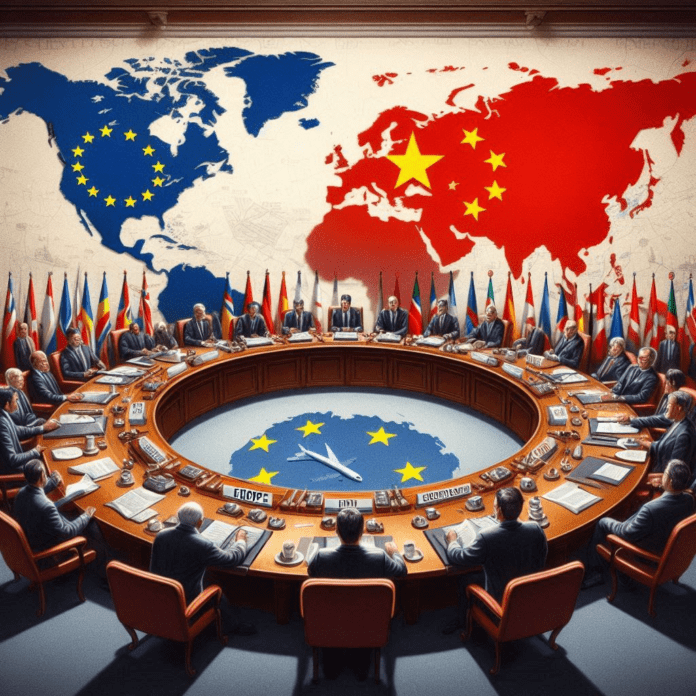Recent events have sparked significant concerns about a possible major economic conflict. At a NATO Summit in Washington DC, important leaders gathered to discuss pressing global issues. For the first time, NATO publicly declared China as helping Russia in its war against Ukraine. A major topic was the growing Seizing Chinese Assets. This was a big shift in NATO’s focus, turning more attention toward China.
NATO’s Secretary General Jens Stoltenberg blamed China for adding fuel to the fire of the largest conflict since World War II. This statement marked a new direction for NATO, suggesting they see China as a major threat. In response, there are talks about NATO and the European Union planning actions against Chinese assets similar to what they did with Russia.
Not long ago, they seized $300 billion of Russian money held in Western banks. Now, it seems they are considering doing something similar with Chinese investments in Europe.
Sell of Frozen Russian Assets, Aid to Allies: 21st Century Peace through Strength Act Passed
Seizing Chinese Assets
There have been discussions, reportedly led by U.S. officials, about taking control of Chinese-owned infrastructure in Europe if tensions escalate. This move is seen as a preparation for potential future conflicts. They aim to reduce China’s influence in Europe by targeting projects like railways, ports, and other key facilities owned by Chinese companies.
However, these actions raise serious legal and ethical questions. Seizing foreign-owned property is not simple and could lead to numerous legal battles. It also sends a worrying message to other countries that might want to invest in Europe. If investments can be taken away based on political disagreements, foreign investors might think twice before putting their money into European projects.
NATO’s 2.7 Billion MK Airbase Project Near Ukraine and Crimea is Strategic Stronghold in Europe
A representative from China has strongly criticized these discussions. They pointed out that while the U.S. continues to trade with Russia, they are blaming China for global problems. The Chinese representative accused the U.S. of trying to bully China and made it clear that China would not accept such actions quietly.
Economic and Legal Consequences
Taking Chinese assets could have severe economic consequences. Europe is already dealing with high costs for natural resources due to its reduced ties with Russia. If they proceed with taking Chinese-owned properties, it might cause even more economic problems. The fear is that such actions could lead to higher production costs and potential shortages of goods, further straining the European economy.
Germany, Europe’s largest economy, is already facing challenges, and this move could worsen the situation. The de-industrialization of Germany is a growing concern, and adding more economic stress could lead to significant instability. Countries that rely on foreign investments might find themselves in a difficult position if investors lose confidence in the stability and fairness of European markets.
China’s Warning to Taiwan Escalates with Missile Tests and Warplanes Deployments
NATO and EU officials seem prepared to start seizing Chinese Assets. The idea of reclaiming Chinese-owned infrastructure has been brought up to gather public support, but it remains highly controversial. Such moves could lead to a new level of economic warfare, with long-term impacts that are hard to predict.
Public Reaction and Potential Fallout
People have shared their thoughts on this complex situation, expressing a range of concerns and opinions. Some worry that these actions are driven more by political motives than practical solutions. Others fear the potential for a significant economic downturn if Europe proceeds with nationalizing foreign-owned assets.
China’s Finland Trade Collapse: The Devastating Impact of Russian Sanctions
However there are difficulties in predicting the economy under such conditions, questioning whether it’s better to invest in stable assets like gold rather than riskier financial investments. The idea of seizing Chinese assets could be “insane,” reflecting the high level of anxiety and disagreement among the public.
The discussion around seizing Chinese assets is a clear indicator of the escalating geopolitical tensions between the West and China. These tensions are not just political but have serious economic implications that could affect the global landscape. As Europe and the U.S. consider these drastic measures, the potential for a major economic conflict looms large.
These facts highlight the delicate and precarious situation. The decisions made in the coming months could shape the economic future of Europe and its relationships with global powers like China.


